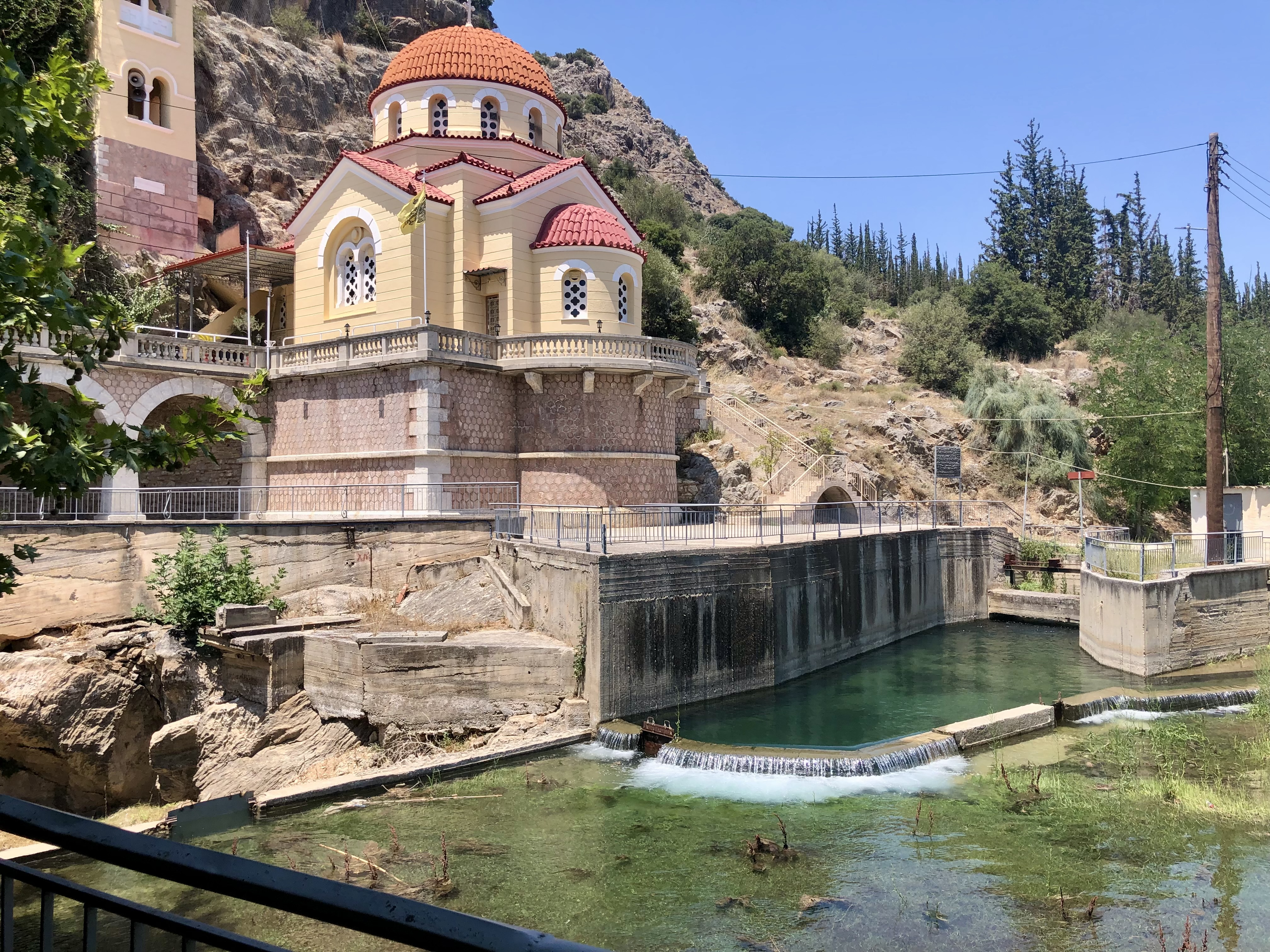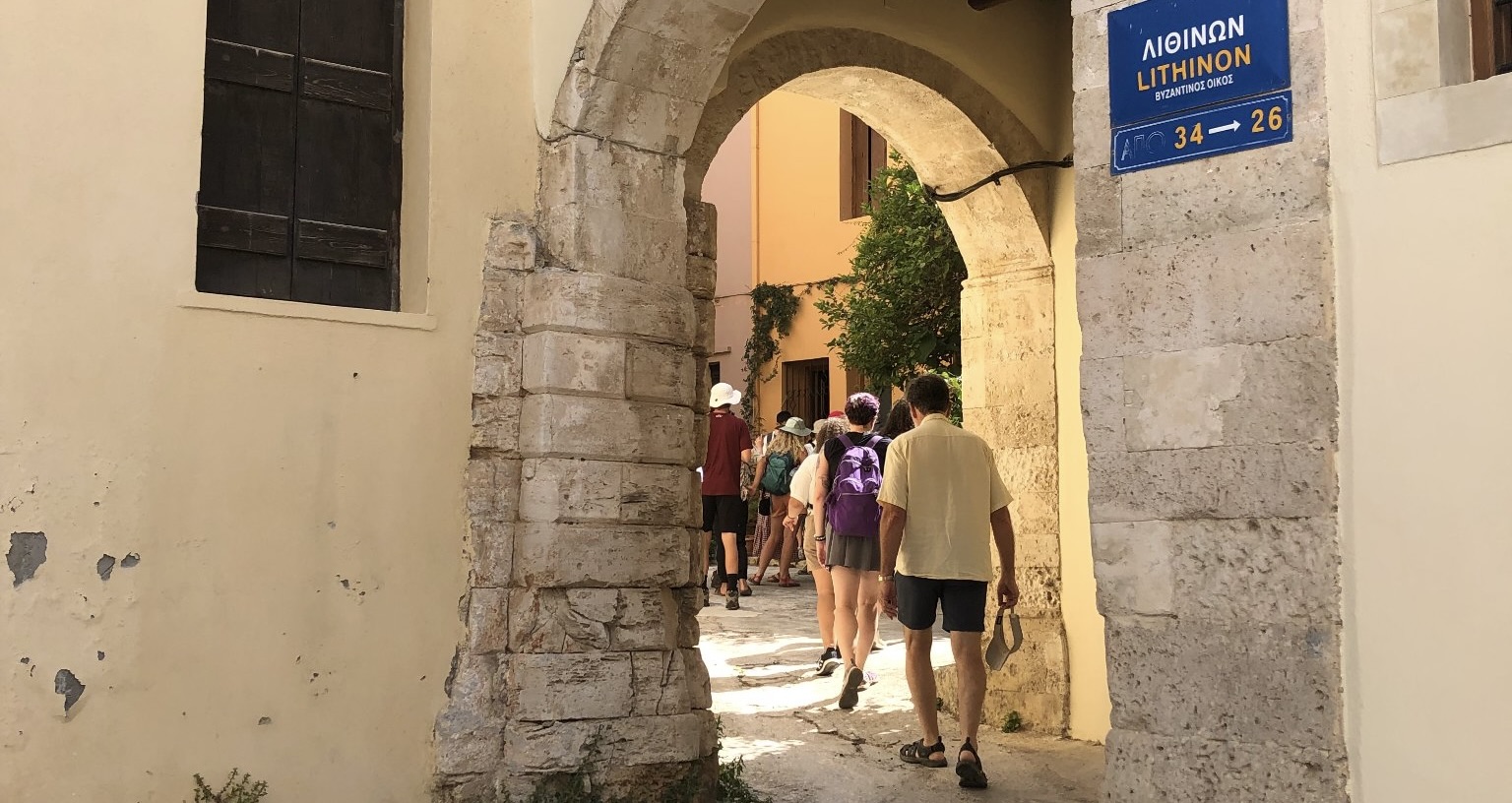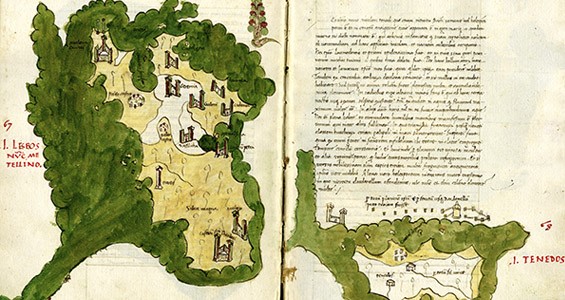Summer Seminars
The Summer Seminars of the American School of Classical Studies at Athens are 18-day programs that focus on specific cultural themes, historical periods, or geographical regions. The Seminars are led by exceptional scholars of Classics and related fields. Under their direction, participants study texts, visit archaeological sites and museums, and engage with expert guest speakers in order to deepen their understanding of Greece’s landscape, history, literature, and material culture.
Past seminars have included: Caves in Greece; Ancient Gender and Sexuality; Greek Sculpture; Myth on Site; Greek Warfare and Culture; Greek Religion; Finding the Spartans; Greece from the Sea; The Northern Aegean; Greek Funerary Customs through the Ages; Warrior Sailors, Traders, and Pirates: Aegean Islands Through the Ages; Alexander to Actium: The Archaeology of Hellenistic Greece; People and Places of Ancient Philosophy; Settlers and Traders: Corinth and Its Apoikiai in W. Greece and S. Albania.
Application Deadline: EXTENDED TO January 31, 2026
2026 Summer Seminars
Landscape with Figures: Human-Environment Interaction in Premodern Greece: (June 15 to July 3, 2026)

The seminar aims to enhance participants' appreciation of environment, climate, and natural resources of Central and Southern Greece as vital contexts for the understanding of historical developments in those regions from antiquity to early modern times. Natural resources and modes of their exploitation in different regions of Greece gave character to both people and places; fluctuations of climate and human habitation tell tales of coexistence and adaptation, with lessons of both successes and failures in sustainability.
This seminar will visit and examine a selection of natural, historical, and archaeological sites in Attica, Boiotia, the Saronic region, and Peloponnese offering a new perspective on historical events, as well as on social and cultural developments of classical antiquity and later periods of Greek history.
Each site visited will be studied with respect to its natural environment and impact of human intervention, including technical enhancements, as well as destructive and sustainable forms of exploitation. We will consider agricultural settings for cultivation of the Mediterranean triad; transhumant pastoralism; ancient and recent water supply, manufacturing, and extraction and processing of terrestrial and marine resources. It will be taught by Professor Irene Polinskaya (King’s College London).
Sites and areas visited may include: Gla and Copaic Basin; Thorikos and Laurion; Lakonia and Eurotas valley; Lake Stymphalia, Dimitsana, Nestane and Kapsia Cave; Nemea and the Argolid; the Athenian Acropolis, Agora, Kerameikos, and the aqueducts will be visited (sites are subject to change).
Chalkidike Peninsula: From Hellenic Colonization to Byzantium (July 9 to July 27, 2026)

This seminar focuses on the Chalkidike peninsula in the North Aegean, and its colonizing cities such as Corinth, Andros and Chalkis on Euboea. A distinctive landscape of Greece in all eras, Chalkidike prompts the investigation of a wide range of historical, archaeological and topographical questions that have both a local impact, and much wider implications from Antiquity to Byzantium.
Due to its strategic location, natural resources and hospitable harbors, the Chalkidike offers an ideal window into Greek colonization, trade, political development and cross-cultural relations.
This seminar addresses some of the most important topics in ancient Greek history, such as colonization, the Persian and Peloponnesian Wars, the expansion of Macedon, the rise of Rome and the transition to Byzantium, along with other key issues in current scholarship such as identity, religion, and political institutions of varying scales. The Chalkidike offers important archaeological data related to settlement patterns, the development of cities over the millennia, current debates about the Greek alphabet, commercial networks, and migrations (ancient and more modern). Taught by Professors Amalia Avramidou (Democritus University of Thrace) and Amelia R. Brown (Australian Research Council Senior Researcher, Honorary Senior Research Fellow, Macquarie University).
Sites and areas visited may include: Corinth, Chalkis, Olynthus, Torone and Potideia (sites are subject to change).
Structure of the Program
The ASCSA Summer Seminars offer unparalleled opportunity to experience the ancient sites, monuments, and culture of Greece first-hand, focusing on specific topics, under the guidance of expert professors deeply familiar with the country and topic, and up-to-date with the latest research.
When in Athens, the Summer Seminars are based at the American School of Classical Studies at Athens. Roughly half of the program is spent in travel throughout Greece, and participants are housed in hotels. The program's commitment to presenting a detailed view of the seminar topic, and Greece's rich history, leads to long days and extensive walking in the hot Mediterranean summer. Participants should be prepared for a rigorous program of study.
Seminar participants receive exclusive access to archaeological sites and storerooms inaccessible to others and enjoy presentations on ongoing excavations by preeminent scholars. Internationally known scholars of Greek history, art, and archaeology will participate as guest lecturers in both seminars. Students are expected to give on-site reports, which they will prepare in their home libraries before the program begins. The program is designed to present a comprehensive view of Greece’s rich history and archaeology. Participants should expect long days at sites and museums, extensive walking on uneven and rocky terrain, and Mediterranean temperatures well above 30ºC/86ºF for extended periods without ready access to shade. Prospective applicants uncertain about their ability to participate in all program activities are encouraged to contact the ASCSA office for more information.
Want to know more? Visit the FAQ page!A Typical Day
 A typical day starts at 7:00AM and ends at 7:00PM. A group will typically visit 3 to 7 archaeological sites and/or museums during the day. Each visit
may include a director’s presentation, tours by invited specialists, and one or more student reports. There is much standing and walking, many sites have steep inclines, and the Mediterranean summer sun is intense, so participants should be prepared for the rigors of the program.
A typical day starts at 7:00AM and ends at 7:00PM. A group will typically visit 3 to 7 archaeological sites and/or museums during the day. Each visit
may include a director’s presentation, tours by invited specialists, and one or more student reports. There is much standing and walking, many sites have steep inclines, and the Mediterranean summer sun is intense, so participants should be prepared for the rigors of the program.
In Athens travel is by walking or public transport (including the efficient metro system). On day trips and extended trips most travel is by private chartered bus with a licensed professional driver; island trips involve ferry rides. Lunch may be picnic style or at local eateries depending on the day’s schedule. Beach stops for swimming are scheduled whenever possible. Continental breakfasts are provided at the hotel every morning. Participants eat dinner on their own at local eateries within walking distance of the hotel. Dinner hour in Greece is typically later than in North America, with many people eating between 8-11pm.
Facilities
When Summer Seminars are based at the American School of Classical Studies at Athens. Participants enjoy 24-hour access to the world-class Blegen Library, including a computer lab, wireless internet access, archives, and individual study space. Participants will be housing in Loring Hall while in Athens, and have access to our welcoming and supportive staff, home-style Greek cooking, gardens, and verandas that look out onto Mount Hymettus. The School also offers numerous opportunities for informal conversation, learning, and networking with professors and students working at the ASCSA, and with members of the international scholarly community in Athens.
Outside of Athens, participants will stay in hotels. Hotels are typically C class, clean and secure establishments with private bathrooms and A/C available. Most hotels have wi-fi. Continental breakfasts are provided at the hotel every morning.
Participants/eligibility
Enrollment is open to graduate and advanced undergraduate students, as well as to high school and college/university teachers of classics and related subjects. Each seminar is limited to twenty participants. The language of instruction is English. Open to all nationalities.
The program is intellectually absorbing and can be physically challenging. Museum visits may involve long periods of standing, while many site visits require hiking uphill in the Mediterranean summer heat. Participants should be ready to work cooperatively as part of a close-knit Summer Seminar group.
Summer Seminar participants become part of the ASCSA alumni/alumnae community, with more than a thousand members around the world. Summer Seminar participation can open the doors to professional connections, mentoring, fieldwork opportunities, and scholarly support for years to come.
An attempt is made to ensure that the session includes undergraduate students, graduate students, high school teachers, and college professors, though there is no quota for any category. The American School of Classical Studies at Athens does not discriminate on the basis of age, color, disability, gender identity or expression, genetic information, national or ethnic origin, pregnancy, race, religion, sex, or sexual orientation when considering admission to any form of membership or application for employment.
Costs
The fee for each 2026 Seminar is $2,750 USD. Fee includes tuition, room for the entire 18-day period, partial board in Athens, travel within Greece, and museum and site fees. International airfare, most meals outside Athens and weekends in Athens, and incidental expenses are the participant's responsibility. Financial aid is available in the form of ASCSA scholarships, awarded on the basis of academic merit; and many classical organizations also offer funding opportunities. More information at https://www.ascsa.edu.gr/programs/summer-session/ss-scholarships. (Rates and fees are subject to change without notice.)
Financial Support
The ASCSA offers a range of Summer Seminar fellowships. Several national and regional Classics organizations also offer scholarships specifically for Summer Seminar participants. Every applicant will automatically be reviewed for an ASCSA scholarship, without extra forms to submit. If awarded an ASCSA scholarship, we will notify you in your admission letter.
Click Here for Scholarship InformationAcademic credit
The American School is not a degree-granting institution. No grades are given for its programs, nor are transcripts provided. An optional final exam at the end of each seminar can given (upon discussion with the Seminar Director), and the director of a seminar will, upon request, write a letter to the member’s home institution recommending that credit be granted, provided that the member has satisfactorily participated in the program and passed the final exam. Inquire about course credit option.
Application
Deadline for the online application and two recommendations is January 31, 2026.
Link to the online application: https://ascsa.submittable.com/submit/270462/ascsa-summer-program-application
You may use this form to apply to the Summer Session and Seminar(s) simultaneously, if you are applying to more than one summer program.
Admission to the Summer Seminar is granted on the basis of academic performance and letters of recommendation.
A complete application consists of the following:
- Applicants must submit the online application form by the deadline. The application form includes:
- A list of colleges and universities attended, with dates of residence, degrees awarded or expected, and any honors attained; a list of any teaching or other professional experience (with institutions and dates or present employment). This information can be entered on to the application form itself, or uploaded as a document to the application.
- A brief statement of your present attainments in the following subjects: Latin and Greek (specify amount of reading done in the original and in translation), ancient history, history of ancient literature, archaeology and history of art. This information should be uploaded as a PDF to the application. Note: such attainments are not a prerequisite or mandatory for participation.
- A brief statement of your future plans. State your future plans and how participation in the ASCSA Summer Program fit into these plans (maximum length 500-600 words). This information should be uploaded as a PDF to the application.
- If you are applying to multiple summer programs, please indicate and discuss your preferences (maximum 250 words). This information should be uploaded as a PDF to the application.
- Please indicate your reading ability in modern and/or foreign languages. This information can be entered on to the application form itself.
- Student applicants must submit transcripts or the equivalent from all post-secondary education. Transcripts in scripts other than Latin or Greek must be translated into English. A copy of a current CV for high school teachers and college professors.
- Applicants for School scholarships can check a box on the application form to be considered for any School (internal) scholarships for which they are eligible. No extra paperwork is necessary. Review the scholarships online to learn about eligibility requirements, as well as external funding opportunities.
- Applicants must arrange for two letters of recommendation to be submitted online. After the online application is submitted, the recommenders will automatically be sent instructions about how to upload their recommendation. Or, applicants may choose to send the request at any time by clicking the "Send Request Now" button on the online application form. Recommendations are due by the application deadline.
All applicants will be notified in February.
Visas
Any U.S. or Canadian citizen who plans to spend more than 90 days in Greece and/or any other member of the Schengen block of countries (Austria, Belgium, the Czech Republic, Denmark, Estonia, Finland, France, Germany, Greece, Hungary, Iceland, Italy, Latvia, Liechtenstein, Lithuania, Luxembourg, Malta, the Netherlands, Norway, Poland, Portugal, Slovenia, Slovakia, Spain, Sweden, and Switzerland) within a six-month period must obtain a special visa BEFORE entry into the Schengen zone. This visa must be issued by a Greek consulate/embassy in a country where the applicant is a resident, and the application process can take two or more months. Any participant who plans to combine, for example, a spring or fall study abroad program with the ASCSA Summer Seminars may exceed the 90-day limit. For further information, click here.
Ready to apply?
The American School of Classical Studies at Athens does not discriminate on the basis of age, color, disability, gender identity or expression, genetic information, national or ethnic origin, pregnancy, race, religion, sex, or sexual orientation when considering admission to any form of membership or application for employment.
Apply NowFor additional questions or information:
Contact the Programs Office in the United States at application@ascsa.org.
Apply to lead a summer program
If you are a scholar who is interested in leading a Summer Seminar or the Summer Session, click here to link to more information about open positions.
Learn More
